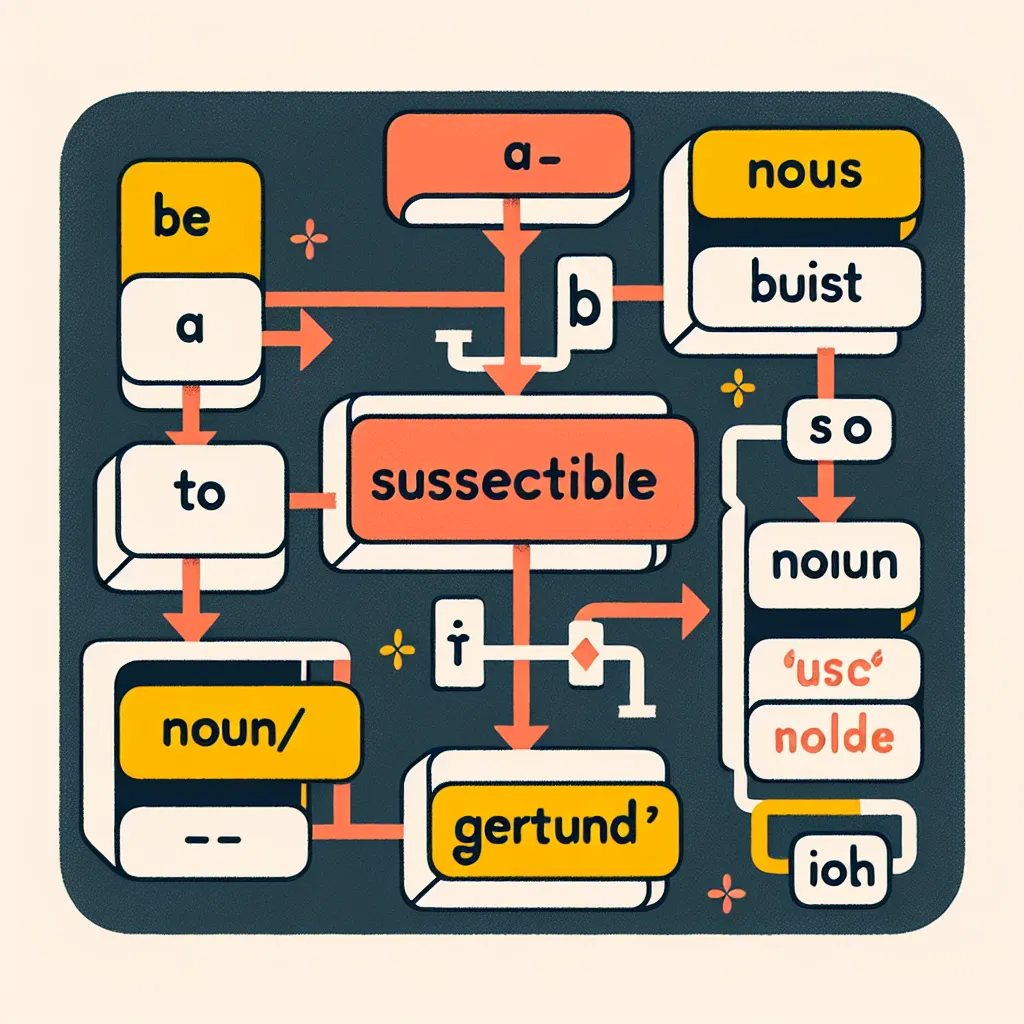The expression “be susceptible to + noun/gerund” is a valuable grammatical structure that frequently appears in IELTS exams. Understanding and utilizing this phrase effectively can significantly enhance your performance across various sections of the test. Let’s delve into its meaning, usage, and application in IELTS context.
Understanding “Be Susceptible to + Noun/Gerund”
“Be susceptible to” means being likely or prone to be affected by something, often in a negative way. This structure is commonly used to describe vulnerability or sensitivity to certain influences, conditions, or actions.

Grammar Structure
The basic structure is:
[Subject] + [be verb] + susceptible + to + [noun/gerund]
Examples:
- Children are susceptible to infections.
- The old building is susceptible to damage from earthquakes.
- Some people are susceptible to developing allergies.
- The company’s reputation was susceptible to being damaged by the scandal.
- Crops are susceptible to failing due to drought.
In these examples, we can see how the structure is used with both nouns (infections, damage, allergies) and gerunds (being damaged, failing).
Application in IELTS Writing
Using “be susceptible to” in your IELTS Writing task can demonstrate a sophisticated command of English. It’s particularly useful in Task 2 essays when discussing social issues, health, environment, or technology.
Essay Example:
Topic: The impact of climate change on agriculture
In many regions, crops are becoming increasingly susceptible to failure due to unpredictable weather patterns caused by climate change. Farmers are finding their yields susceptible to dramatic reductions as extreme weather events become more common. Moreover, certain plant species are susceptible to extinction if they cannot adapt quickly enough to changing conditions. To mitigate these risks, agricultural practices must evolve to be less susceptible to climate-related disruptions.
Analysis:
- “susceptible to failure”: Shows vulnerability of crops
- “susceptible to dramatic reductions”: Indicates potential for significant decrease in crop yields
- “susceptible to extinction”: Highlights the extreme risk to some plant species
- “susceptible to climate-related disruptions”: Demonstrates the need for adaptive agricultural practices
Enhancing IELTS Speaking Responses
Incorporating “be susceptible to” in your speaking responses can elevate your language use, potentially boosting your score in the Lexical Resource and Grammatical Range criteria.
Speaking Part 2 Example:
Topic: Describe a time when you or someone you know got sick
“Last winter, my younger sister fell ill with a severe case of flu. She’s always been susceptible to respiratory infections, especially during the colder months. This time, she was particularly susceptible to complications because she had been overworking and not getting enough rest. Her weakened immune system made her susceptible to a secondary bacterial infection, which prolonged her recovery…”
In this example, the repeated use of “susceptible to” demonstrates a range of applications, showing how external factors (cold weather), personal conditions (overwork, lack of rest), and medical situations (weakened immune system) can all make someone susceptible to illness or complications.
Common Errors and How to Avoid Them
-
Incorrect preposition:
- Incorrect: “He is susceptible for colds.”
- Correct: “He is susceptible to colds.”
-
Using an adjective instead of a noun/gerund:
- Incorrect: “The metal is susceptible to rusty.”
- Correct: “The metal is susceptible to rusting.”
-
Confusing with similar phrases:
- Incorrect: “She is susceptible of making mistakes.”
- Correct: “She is capable of making mistakes.” OR “She is susceptible to making mistakes.”
-
Incorrect verb form after ‘to’:
- Incorrect: “They are susceptible to changed their minds easily.”
- Correct: “They are susceptible to changing their minds easily.”
-
Using it with positive connotations (uncommon):
- Awkward: “He is susceptible to success.”
- Better: “He is prone to success.” OR “He is likely to achieve success.”
Expanding Your Vocabulary: Synonyms and Related Phrases
To further enhance your IELTS performance, consider these alternatives to “be susceptible to”:
- Prone to
- Vulnerable to
- Liable to
- At risk of
- Predisposed to
Example usage:
- “Elderly people are prone to falling.”
- “The coastline is vulnerable to erosion.”
- “Teenagers are often liable to mood swings.”
- “Workers in this industry are at risk of developing respiratory problems.”
- “Some individuals are genetically predisposed to certain diseases.”
Conclusion
Mastering the use of “be susceptible to + noun/gerund” can significantly enhance your IELTS performance. This versatile structure allows you to express vulnerability or sensitivity to various factors, which is particularly useful in discussing complex topics in both the Writing and Speaking sections. Remember to practice using this phrase in different contexts, and don’t hesitate to incorporate its synonyms to showcase your lexical range. By doing so, you’ll be well-equipped to tackle a wide range of IELTS topics with confidence and linguistic sophistication.